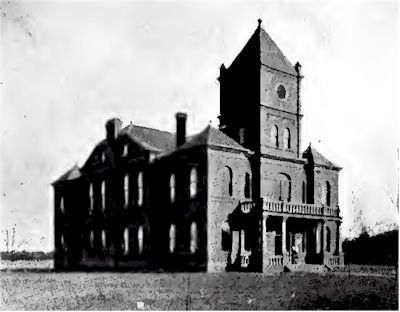|
Welcome
to Maryland American
History and Genealogy Project
we are in the process of
building new State and County pages for the states where
the coordinator has moved on to other projects. Charles County is looking for a new Coordinator would you
be interested? If so please contact
Webmaster.
Many of the present coordinators are always willing to give help and
suggestions to newcomers, you can learn, I did and that was after 60!!
Read our
About Page and see what our requirements are,
pretty easy!


Court House at La
Plata
Charles County lies on the Potomac River, its southern
and western boundary, with Prince George's on the north
and St. Mary's on the east. Between the two counties a
tongue of Charles extends to the Patuxent, and it was on
this, at Benedict, that Ross' army disembarked for the
march to Washington in 1814.
The county was organized in 1658 and given the Christian
name of the second Lord Proprietary. Its area is 460
square miles, and its great reach of water front on the
Potomac, in a huge bend of which it is situated, gives
it important resources in riparian products, oysters,
fish, and water fowl. The Wicomico River, Nanjemoy, Port
Tobacco and Mattawoman Creeks are tributaries of the
Potomac in this county.
Tobacco is the principal crop, the average yield being
five hundred pounds to the acre, and corn and wheat are
grown in considerable quantities. The Pope's Creek line
of the Baltimore and Potomac Railroad terminates at
Pope's Creek, on the Potomac. In the middle section of
the county the land is level, and in other parts its
rolling surface is locally designated as "valleys." Port
Tobacco, from colonial times the county seat, was
succeeded a decade ago by La Plata, on the railroad. The
entire village population of the county is very small.
The United States Naval Proving Grounds, a government
reservation at Indian Head, in northwestern Charles, is
where guns and projectiles for the Navy are tested.
Marshall Hall, nearly opposite Mount Vernon, is closely
connected with the memory of Washington, and is now an
excursion resort. General William Smallwood was from
Charles, and for a century his grave on the ancestral
estate, near the old brick dwelling in which he and
General Washington held Masonic meetings, was marked
only by a walnut tree.
On July 4, 1898, the Maryland Society of the Sons of the
American Revolution unveiled a massive monument on the
spot. This county was also the home of Thomas Stone, a
signer of the Declaration of Independence; of Michael
Jenifer Stone, a representative in the first Congress,
who voted to place the seat of Federal Government on the
Potomac; of Governor John Hoskins Stone, distinguished
at Long Island, White Plains, Princeton, Germantown; of
Robert Hanson Harrison, Washington's military secretary,
and a long list of able and brilliant men.
Online Here or Other Sites
Maryland
AHGP

Source: History of Maryland, by
L. Magruder Passano, Wm. J.C. Dulany Company, 1901.
|



